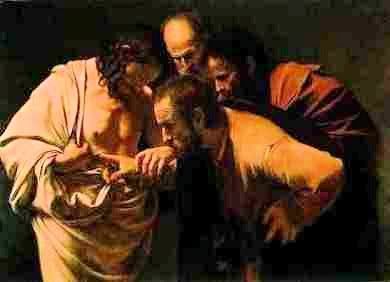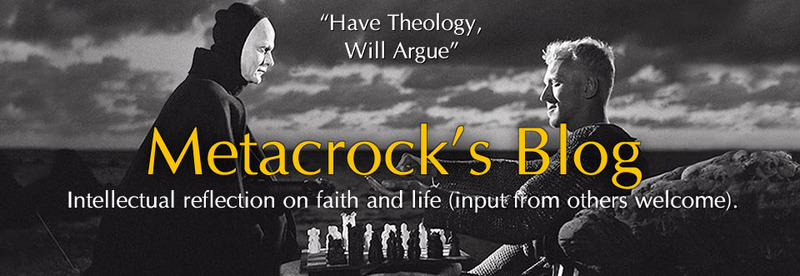
One of the major things that a lot people don't get is that there are different levels to which we can attach the word "proof," and also the word "certainty." In arguing with atheists I am often told "proof is for mathematics." Then the next post some atheist saying "there's no proof for your God." If the term proof can only be used in math why would we expect to find proof of God? Or anything else for that matter except math problems?" The last time someone told me that I said "fingerprints are considered proof at a crime scene." It's true there is a standard of proof in court and also in intercollegiate debate that is not mathematical. So one can speak of "proof" on different levels.
....I have been lowering the bar for God arguments by arguing that I don't claim to prove the existence of God just to prove that belief is ratinoally warranted. I still think that's a fine idea and I find that Alvin Plantinga has a similar approach too. So I feel like that's vindication for my view. Yet I slip up and speak of "proof" in God arguments at times. That's partly becuase atheist speak of proof so much, they demand proof even though they know its a standard beyond the domain of most issues. It's also because I think we can speak of "proof" in a sort of level 2 sense. It proof in the absolute sense but verisimilitude. Like getting fingerprints at a crime scene is "proof" in court but it's not on par with the certainty of a mathematical equation. In Kant's sense of "practical reason" we can speak of the rational warrant as 'proof' as long as we are clear that this is what we are doing.
....The same applies to "certainty." Recently I posted a blog spot called "we can have certainty about God's love." I do really believe we can but then it's not on the same level of certainty as empirical scientific data or math. It's an inner personal sense of certainty. The kind certainty where you don't doubt. I'm not sure that one can't doubt empirical proof. I think the inner certainty of faith of which I speak is a strong and deeper form of certainty. i seemed to contradict all of this with the comment section. A friend atheist named Mike posted this:
"The only way to know of it's reality is to experience it."
How do you know you are not delusional? I admit that I could be totally deluded in my atheism.
I said:
You can't know with the kind of absolute certainty of mathematics, maybe not even with the kind of retaliative certainty of scientific data. That's the point of my argument "from epistemic judgement." we have to make a judgement, we can't know certifiably so we have to judge (educated guess).He's talking about at the epistemological level. He's talking about the deepest level of knowing. That's the level upon which Descartes asked "how do I know I really exist?" Mike is actually proposing the empiricist dilemma, how do we get outside our own heads and check our perceptions? That's the level upon which I say "we can't." There is absolute certainty in that sense. Descartes found an answer that satisfied him in the cogito ("I think, therefore, I am"). One could still question it, but the answer is personally satisfying.Yet it's not proof against delusion. How do I know my thinking is not a delusion?
that can be better than just a blind guess by going with what is consistent and waht works. But we don't have any better of an understanding with scinece or materialism. Not for big picture issues like meaning of life. So if we want to make the best judgement we can we go by what works. Religious experience works.
I call that "certainty" because its as much certainty as we get about anything; it's existential certainty.
////we can only answer with means of a judgement. Reasoning that everything is consistent with the answer "I'm not" is a judgement. That is actually falling back upon the criteria that I say (in my major God argument--form epistemic judgement--aka my Thomas Reid argument) we use to determine the reality of our experiences: that they are regular, consistent, inter-subjective (other find the same conclusion) and can be used for navigation. That last is important becuase its especially true of religious experiences but in a different sense than sense data. Sense data can be used for navigation in a physical sense, it doesn't work to walk though walls or play on the freeway so use doors and stay off the freeway. Religious experience is navigational but in a more emotional sense, sort of the strength to get through life. Anyone who thinks that's trivial is either an idiot or under 40.
....The next time an atheist tells you "there's no proof for you God," pin them down. What level of proof? If mathematical why should we expect it? If empirical, I can doubt empirical but why should we expect that. Science can't deal with epistemology it's below the level. What I call existential certainty is more important than scientific certainty. Scientific certainty can be overturned. I call it existential because it's coming from the place where one's experience of reality meets the road so to speak. That kind of certainty can't be doubted.
////The one draw back to this level of certainty is that it's private. You can't pass it on. Mike comes back and says he had uncertainty as a Christian. All I can say is "I don't." That's good enough for me. I caution that one be care about what exactly is doubtful. If it the reality of God, which is being itself, or the way God is understood in your community? Maybe you just need to enlarge your understanding of God.

No comments:
Post a Comment